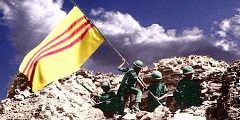Trao tặng bản Nghị quyết UNESCO tôn vinh Chủ tịch Hồ Chí Minh
03/10/2010 14:44
UNESCO vừa trao tặng Bảo tàng Hồ Chí Minh cuốn sách văn bản Nghị quyết của Đại hội đồng UNESSCO về việc tôn vinh Chủ tịch Hồ Chí Minh là Anh hùng giải phóng dân tộc, Danh nhân văn hóa thế giới.

Đây là sự kiện diễn ra trong khuôn khổ triển lăm "Hồ Chí Minh và học tập suốt đời", do Bộ Giáo dục Đào tạo, Bộ Văn hóa Thể thao Du lịch khai mạc sáng 2/10 tại Bảo tàng Hồ Chí Minh.
Triển lăm hưởng ứng cuộc vận động "Học tập và làm theo tấm gương đạo đức Hồ Chí Minh", kỷ niệm Ngày Khuyến học Việt Nam (2/10) và Đại lễ 1000 năm Thăng Long - Hà Nội.
Tổng Giám đốc UNESCO (Tổ chức Giáo dục, Khoa học và Văn hóa của Liên hợp quốc) Irina Bokova, Bộ trưởng Bộ Văn hóa, Thể thao và Du lịch Hoàng Tuấn Anh, Thứ trưởng Bộ Giáo dục và Đào tạo, Phó Trưởng Ban Chỉ đạo quốc gia về xây dựng Xă hội học tập Nguyễn Vinh Hiển, Phó Chủ tịch UBND thành phố Hà Nội Ngô Thị Thanh Hằng đă cắt băng khai mạc Triển lăm.
Nhân chuyến thăm này, Tổng Giám đốc UNESCO đă trao tặng phía Việt Nam, Bảo tàng Hồ Chí Minh cuốn sách văn bản Nghị quyết của Đại hội đồng UNESSCO khóa 24 họp từ 20/10 đến 20/11/1987.
Trong đó có Nghị quyết 18.65 ghi tại trang 134 và 135 về việc tôn vinh Hồ Chí Minh là Anh hùng giải phóng dân tộc, Danh nhân văn hóa thế giới.
Tổng Giám đốc UNESCO đă bày tỏ ḷng tôn kính đối với Chủ tịch Hồ Chí Minh - Người khai sinh nền độc lập của Việt Nam. Bà khẳng định, Hồ Chí Minh trước hết là một nhà thơ, nhà báo, nhà giáo nên Người nhận thức rất rơ tầm quan trọng của giáo dục, chỉ có thông qua giáo dục con người mới có đủ năng lực để thực hiện Quyền tự quyết. Nguồn vốn con người là qúy giá nhất - Nguồn vốn ấy không thể có được qua cách thức học một lần trong thời thơ ấu mà phải cần học tập suốt đời. Hồ Chí Minh chính là một tấm gương về học tập suốt đời.
Trên cương vị là Tổng giám đốc UNESCO, bà Irina Bokova đánh giá cao Việt Nam đă dành 20% ngân sách đầu tư cho giáo dục và hiện đang có nhiều nỗ lực để xây dựng một xă hội học tập. UNESCO cam kết tiếp tục hỗ trợ, sát cánh cùng Việt Nam phát triển giáo dục, thành lập trung tâm học tập suốt đời tại Hà Nội.
Tổng Giám đốc UNESCO cũng bày tỏ niềm tự hào là đối tác tham gia bảo vệ và quảng bá các di sản của Việt Nam, trong đó có Hoàng Thành Thăng Long.
Bộ trưởng Bộ Văn hóa, Thể thao và Du lịch Hoàng Tuấn Anh cho biết, Triển lăm "Hồ Chí Minh và học tập suốt đời" sẽ được tổ chức đồng thời tại các Chi nhánh của Bảo tàng Hồ Chí Minh ở TP Hồ Chí Minh, Nghệ An, Cao Bằng nhằm khắc họa sinh động tấm gương Hồ Chí Minh về học tập suốt đời qua những việc làm, hành động cụ thể như học tiếng Pháp từ các thủ thủy trên tàu, học trong ngục tù… động viên mọi tầng lớp nhân dân hăng hái học tập nhằm thực hiện cho được lời căn dặn của Bác: văn hóa giáo dục là sức mạnh của một dân tộc, "một dân tộc dốt là một dân tộc yếu"....




 Reply With Quote
Reply With Quote

Bookmarks